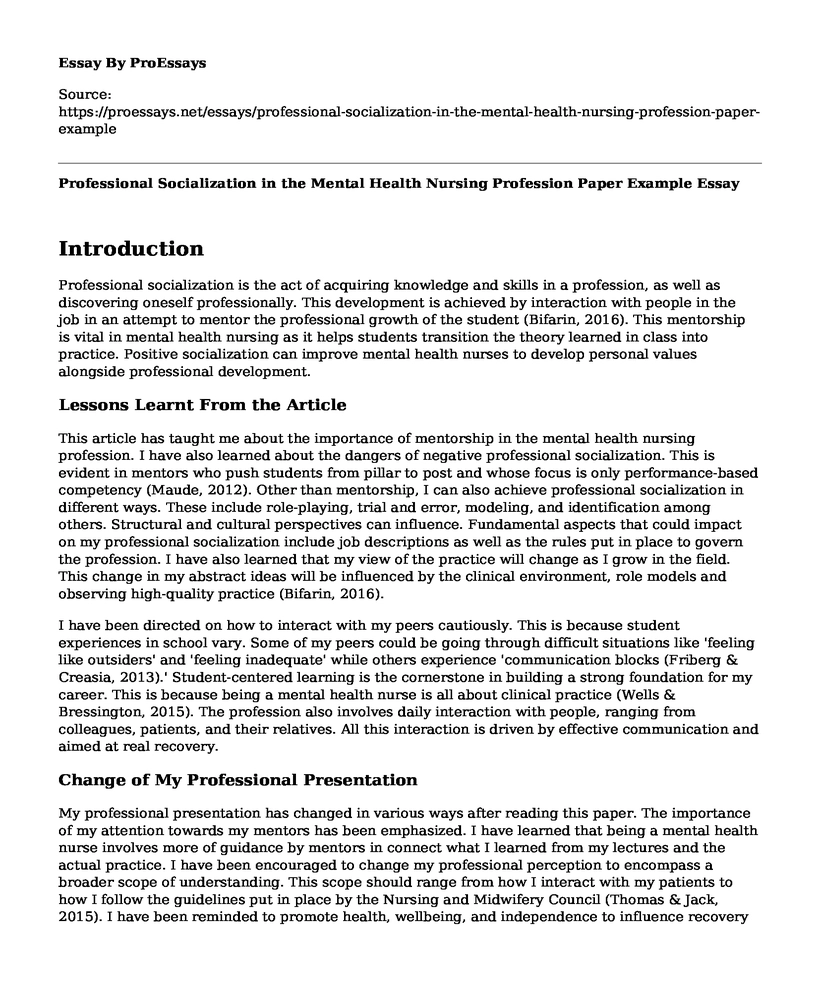Introduction
Professional socialization is the act of acquiring knowledge and skills in a profession, as well as discovering oneself professionally. This development is achieved by interaction with people in the job in an attempt to mentor the professional growth of the student (Bifarin, 2016). This mentorship is vital in mental health nursing as it helps students transition the theory learned in class into practice. Positive socialization can improve mental health nurses to develop personal values alongside professional development.
Lessons Learnt From the Article
This article has taught me about the importance of mentorship in the mental health nursing profession. I have also learned about the dangers of negative professional socialization. This is evident in mentors who push students from pillar to post and whose focus is only performance-based competency (Maude, 2012). Other than mentorship, I can also achieve professional socialization in different ways. These include role-playing, trial and error, modeling, and identification among others. Structural and cultural perspectives can influence. Fundamental aspects that could impact on my professional socialization include job descriptions as well as the rules put in place to govern the profession. I have also learned that my view of the practice will change as I grow in the field. This change in my abstract ideas will be influenced by the clinical environment, role models and observing high-quality practice (Bifarin, 2016).
I have been directed on how to interact with my peers cautiously. This is because student experiences in school vary. Some of my peers could be going through difficult situations like 'feeling like outsiders' and 'feeling inadequate' while others experience 'communication blocks (Friberg & Creasia, 2013).' Student-centered learning is the cornerstone in building a strong foundation for my career. This is because being a mental health nurse is all about clinical practice (Wells & Bressington, 2015). The profession also involves daily interaction with people, ranging from colleagues, patients, and their relatives. All this interaction is driven by effective communication and aimed at real recovery.
Change of My Professional Presentation
My professional presentation has changed in various ways after reading this paper. The importance of my attention towards my mentors has been emphasized. I have learned that being a mental health nurse involves more of guidance by mentors in connect what I learned from my lectures and the actual practice. I have been encouraged to change my professional perception to encompass a broader scope of understanding. This scope should range from how I interact with my patients to how I follow the guidelines put in place by the Nursing and Midwifery Council (Thomas & Jack, 2015). I have been reminded to promote health, wellbeing, and independence to influence recovery of my patients. I have learned that my professional presentation is not merely dependent on my professional competence but also my values as a person. Interaction with my colleagues is also crucial to their professional outcomes as well.
Conclusion
Professional socialization is vital in the mental health nursing profession. The guidance by my mentors is critical in becoming an all rounded professional, with well-developed professional competencies as well as personal values. I have been challenged to get regular feedback from my mentors as this will equip me with a more hands-on approach to the clinical practice. I have been cautioned against negative professional socialization which in today's healthcare practice has culminated into vices such as patient negligence. Professional socialization is therefore crucial in making me an all rounded mental health nurse and in the promotion of the development of my values.
References
Bifarin, O. (2016). Professional Socialisation: The Art in Mental Health Nursing Practice. British Journal of Mental Health Nursing, 5(5), 228-231. Retrieved From: https://www.magonlinelibrary.com/doi/abs/10.12968/bjmh.2016.5.5.228/
Wells, H., Bernal, C., & Bressington, D. (2015). Becoming a Mental Health Nurse; A Three Year Longitudinal Study. Knowledge Management & E-Learning: An International Journal, 7(1), 100-118. Retrieved From: http://kmel-journal.org/ojs/index.php/online-publication/article/view/272/
Thomas, J., Jinks, A., & Jack, B. (2015). Finessing Incivility: The Professional Socialisation Experiences Of Student Nurses' First Clinical Placement, a Grounded Theory. Nurse Education Today, 35(12), E4-E9.
Friberg, E. E., & Creasia, J. L. (2013). Conceptual Foundations: The Bridge to Professional Nursing Practice. Elsevier Health Sciences.
Maude, P. (2012, August). Utilising Reflective Practice Journals To Explore Student Fears And Feelings During Psychiatric Nursing Clinical Placement. In International Journal of Modern Education Forum (Vol. 1, No. 1, pp. 20-26).
Cite this page
Professional Socialization in the Mental Health Nursing Profession Paper Example. (2022, Dec 18). Retrieved from https://proessays.net/essays/professional-socialization-in-the-mental-health-nursing-profession-paper-example
If you are the original author of this essay and no longer wish to have it published on the ProEssays website, please click below to request its removal:
- Report Example: Childhood Obesity Among Year 6 Pupils in London Borough of Lewisham
- Essay on Use of NIV with COPD Patients
- Schizophrenia Case Analysis
- Ricin Under the Geneva Protocol Essay Example
- Essay Sample on Soft Skills: Essential for Professional Success
- Inadequate Self-Control: Causes, Effects & Solutions - Essay Sample
- Reducing Ventilator Infections: Establishing Intents for the Capstone Project - Paper Sample







